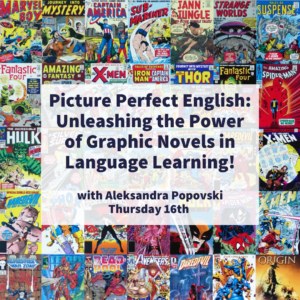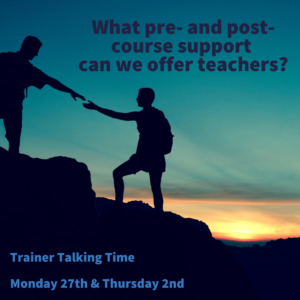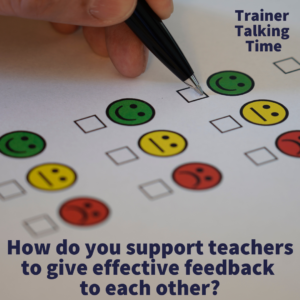What pre- and post-course support can we offer teachers?
Not sure if there was less interest in this topic or just everyone’s very busy (I know I am!) so notes are a little thin on the ground with more questions than answers😃
Pre-course support
Thinking about pre-service qualifications like the CELTA and CertTESOL, how much should/could trainees do before starting the course?
Can you contextualise something before you’re in the experience? Do new teachers have the necessary experience to draw on to make sense of everything?
Something focused on community building – getting to know the platform, each other, with tasks (forum/slack) to introduce themselves and something on beliefs (what will your classroom look like?) and expectations.
Exposing people to just how intense it is – if we know how stressful the course is for almost everyone, is it a problem with the course?
We also had an interesting chat about whether trainers are trying to fit more into the course? (as the profession has developed, there’s more things that we want trainees to be aware of, e.g. nativespeakerism, PARSNIPS, etc. but the four-week timeframe hasn’t changed)
In-course support
Reflection activities – we need to give people time/space and focus to consolidate what they’re learning.
Post-course support
What can you offer trainees as paid support and free support? e.g. careers advice could be free
You need to factor in the extra workload – both in terms of participant effort and tutor response.
Access to materials after the course (e.g. journal subscriptions for a period of time)
Six-month check-in / reflection / feedback (reunion) – what materials are you using that you’d like to share? – also beneficial for the centre to hear feedback after course participants have had more time to reflect as we often get quite immediate feedback at the end of a course
Hub digest – 1st March, 2023
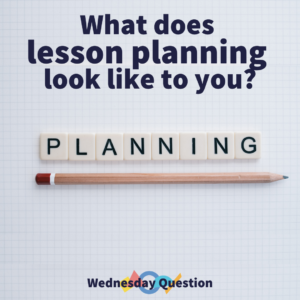


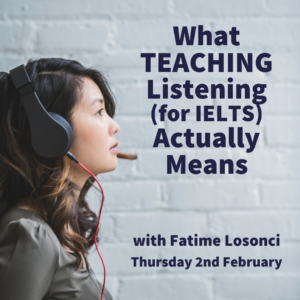


Welcome to March, Hubsters! It’s been a busy month in the Hub with three fabulous webinars from Fatime Losonci (What teaching listening for IELTS actually means), Peter J Fullagar (Why LGBTQIA+ in ELT matters) and Clare Hayward (How you can use Canva in ELT). And we reflected on a variety of topics with the Wednesday Questions:
- How do you set fees as a freelancer?
- What are your top tips for video creation?
- What does lesson planning look like to you?
There were some great discussions…
Jack asked about hints and tips for using breakout rooms, Sarah continued the chat around ChatGPT and Nina asked about the differences between observing online and in-person. Karen asked about homework tasks, Michelle asked what inspiring inquiries would interest your learners and Rachael shared a link to a chat with Meri Maroutian, the non-native speaker, which got people talking.
Valentina asked about niching not once, but twice 😀 and about NLC (neuro language coaching).
Also, Shay asked how teacher beliefs can influence the classroom.
We had some wonderful lesson materials…
Peter shared a resource celebrating LGBT+ History Month in the UK and Silvina was back with lesson plans on the power of surprise, making mistakes and one based around a bad day.
Quick and Easy English had resources for Valentine’s Day, making decisions and the present perfect, as well as a Jeopardy-style quiz.
Jo shared videos on working with conditionals and asked how inclusive your coursebook is. and Catherine shared a game on St. David’s Day.
There was lots of other content from Hubsters too…
Ciarán of Englii shared a round-up of February webinars – keep an eye on the site as he posts a calendar most months and Robert shared a link to The University Grapevine with an article from Emily Bryson, who presented in the Hub last year.
If you’re looking for UK-based summer work, Elen shared a link to a company she had experience with and Rozalia was looking for volunteers to get involved in a bilingual book project.
And in Trainer Talking Time, we discussed how teachers can give effective feedback.
How you can use Canva in ELT – with Clare Hayward
In this session, Clare and Teresa chatted about the joys of using Canva, some of the extra features you can get with a Pro account and the different ways ELT professionals can use the site in their materials, social media and more.
Find out more about Clare’s Canva course on her website: https://hayward-training.com/services/
Why LGBTQIA+ in ELT matters – with Peter J Fullagar
Huge thanks to Peter for coming along to chat about why LGBTQIA+ matters in ELT. He’s written a blogpost outlining his session and has also kindly shared the slides.
You can follow Peter on LinkedIn for more fabulous resources for your lessons as well as further information on DEI and making our classrooms more representative.
How do you support teachers to give effective feedback to each other?
As always, these notes were taken whilst listening to the chat, so they aren’t always full sentences 😆 These were a couple of questions I posted to kick off the chat, but it went in some interesting directions around the mindset of being observed and how who we’re observing will affect the type of feedback given:
- What training do you currently provide teachers who participate in peer feedback?
- What are important factors to consider regarding the affective and procedural aspects of giving feedback?
And more questions came out of the session. For example:
- What are people’s expectations of feedback?
- What have been people’s experiences of feedback in the past?
This tied in with exploring the teacher’s perception of what a good teacher is…exploring their implicit beliefs so we have an awareness of what they believe and can adapt our feedback appropriately.
In the case of a pre-service qualification, it’s a whole new world, with people coming from different backgrounds, cultures, ages – at the beginning can be very difficult because of worrying about hurting their peers. Time is a factor – do we have the space to provide adequate support?
We talked about creating a climate of confidence, learning by example and modelling the types of questions you would expect them to ask each other, with more tutor-led questioning at the start.
It’s also important to allay their fears – feedback coming from the tutor is based on criteria (on certain courses), it’s not personal, it’s to help them develop. Is there a teacher development criteria? Cambridge had a beta version of a self-assessment tool. Jim created a similar one and tried it out for a few years. There were issues around teachers using self-assessment and overgrading their abilities. Having a framework can also help teachers to imagine their development journey (I’m here now and this is where I could be…). This could help developing teachers see if they’re ready for a higher level qualification.
Procedural
Perhaps different for initial training sessions and peer observations
THINK (thoughtful, honest, informed, necessary, kind)
Backing things up with facts – about the lesson, rather than the teacher
What sort of feedback do people need at different levels? (e.g. trainee teacher / new teacher / Delta level teachers) Need to filter, and alter expectations of what the teacher will be doing
What language do we use and are the teachers familiar with it? (eliciting, inx) But also are they concepts which will be useful to teachers in their context? Are the teachers open to trying new things?
It’s a good idea for the person looking for feedback to ask the questions to support observers…asking a specific question can help to direct the feedback and makes it more valuable for the person receiving feedback.
Stimulus recall – describe what happened and then ask them about what they were thinking at that point.
Affective
Positive feedback is not just a compliment – it should be advice to continue with good practice (and this is as important as highlighting where there can be improvement)
The feedback is based on the lesson, not the teacher.
Feedback is not just constructive criticism.
When and how do we give feedback?
Providing written feedback before oral feedback – gives teacher the time to look at things before the feedback chat. Adding an audio note alongside the written feedback helps to make the tone clearer. You could use screencastify or something similar to record a video with audio.
Waiting to provide written feedback til after oral feedback can have its benefits, e.g. a teacher might see something very differently (perhaps with good rationale).
“This is what I saw…What are your thoughts?” (describing rather than evaluating)
Importance of including evidence in observer commentary
More exploratory questions. Direct questions can be useful but exploratory questions help teachers to explore their beliefs more deeply.
The Sandwich Method – is it sincere?
Have teachers draw a flower – petals are things that worked well, two leaves are the things to work on
Allowing for informal feedback – on an in-person course, they would go off and grab a coffee at the end and share initial thoughts informally. Do we still allow space for this on online courses? And not only between trainees, but also on an in-person course, it’s easier for the tutor to grab a teacher and check if they understood all the feedback, chat through something in a bit more detail…
Observation
With a session on feedback, the topic of observation inevitably came up too!
Observation isn’t the only tool that should be used to help teachers see where they need to be. With some teachers it can help them identify where they want to be, but needs to be combined with other tools to be truly effective.
The pre- and post- is REALLY important as well.
Sit down with a teacher and plan a lesson together. Experienced teacher teaches it. Then plan another lesson together and newer teacher teaches it, with feedback after each stage. A lot of teachers need that extra support around planning too
EQUALS – distinction between qualitative observation (get a snapshot of how things are going at the school level) and developmental (more focussed on the individual).
Observing the teaching and learning, not the teacher.
Stigma around observation, often used as an administrative tool rather than developmental. Teaching a ‘display lesson’, rather than showing what actually happens in the lesson on a regular basis.
Some resources
- https://www.tefltraininginstitute.com/podcast/2020/10/19/observing-new-teachers-with-matt-courtois – This episode wasn’t directly related to giving feedback, but had some interesting points
- Jim Fuller shared Gebhard’s Models of Supervision. This also comes up in Rachel Tsateri’s blogpost on feedback, which mentions Heron’s counselling interventions as well.
- Duncan Foord did a webinar on feedback and here are his slides: Feedback on your feedback Innovate 2021 – Duncan Foord
- The Cambridge Train the Trainer course is no longer running, but they recommend the book From Teacher to Trainer. ETpedia also have a resource book for teacher training.
